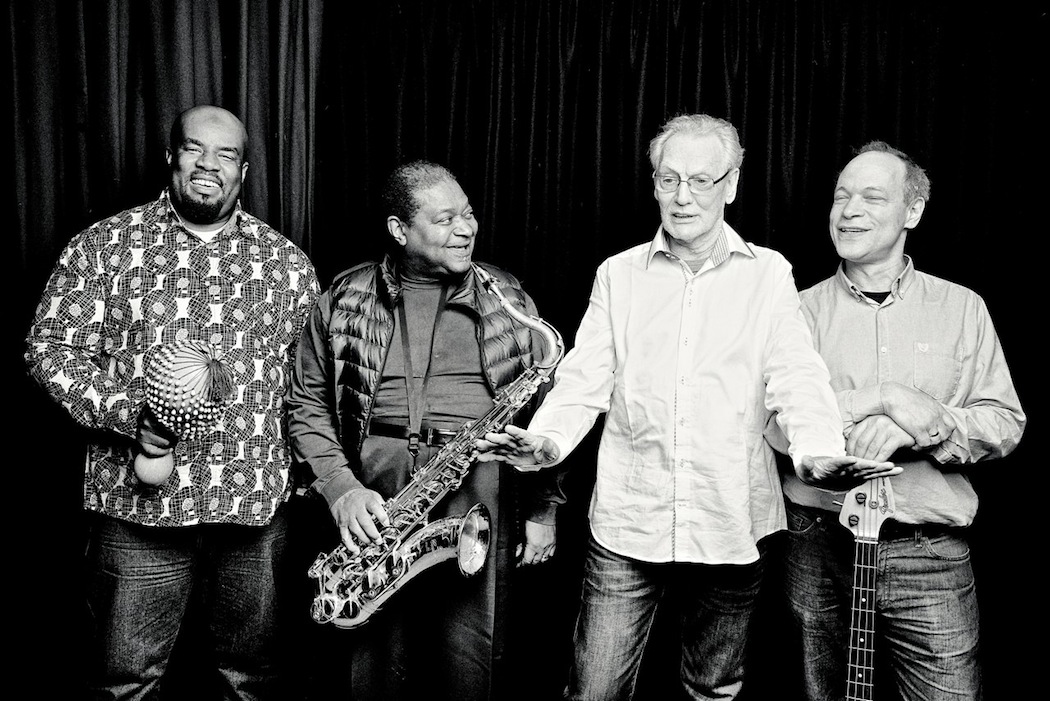Advertisement
Wot? Ginger Baker Is Talking? Well, More Or Less

I was having dinner with former Gang of Four drummer Hugo Burnham in Coolidge Corner not long ago and Ginger Baker’s name came up. Baker — the 74-year-old drummer who came to superstar fame with Cream and Blind Faith — is playing the Wilbur Theatre Sunday with his aptly named group, Ginger’s Baker’s Jazz Confusion.
Baker is also the subject of an acclaimed 2013 documentary called “Beware of Mr. Baker” (98 percent critic’s rating on Rotten Tomatoes). When he’s on camera, Baker covers all the bases from disinterested to dismissive to prickly to antagonistic.
“The thing about Ginger,” says Burnham, of his fellow Brit, “is that he goes way beyond the too-familiar ‘difficult’ or ‘cantankerous’ musician, most of whom are that way because they get away with it, or because it is a game — like John Lydon does. Ginger is a miserable, miserable bastard who would be that way with or without the leeway afforded him being an iconic drummer.
“His 'greatness' is built not just on his terrific, but hardly unique, polyrhythmic abilities and mastery but on the luck and timing of who he played with and when. And that applies to any of us, really! He'd be a muttering, shouty homeless guy without those elements of his career ... At least he likes Charlie Watts.”
Strong language
Yes, the Rolling Stones drummer is one of Baker’s peers — they share jazz roots — and Watts speaks fondly of Baker’s skill. As do many other drummers (and other musicians) in “Beware of Mr. Baker” — Eric Clapton and Carlos Santana, Pink Floyd’s Nick Mason, the Police’s Stewart Copeland and Metallica’s Lars Ulrich. I put a few of those prominent names to Baker when I talked to him last month on the phone from his English home.
“Some of them were musicians I’m not particularly fond of,” Baker says, with a gruff laugh. "The drummer of what’s that silly band, Red Hot Chili Peppers? [Chad Smith] He was surprised I’d never heard him play. Well, I hadn’t. I’d never heard the Red Hot Chilli Peppers either.”
No surprise, there, because, as Baker says at another point — asked if there’s any music he listens to or enjoys — responds, “I know some people do, but I don’t. I don’t enjoy listening to other music much at all.”
If you’re getting the sense that Baker doesn’t enjoy interviews — even more so than he doesn’t enjoy other people’s music — you’re on the right track. (Click here for the full-bore Q and A.)
Still, at some level Baker knows there’s a promotional component to talking to the dreaded press. There are tickets to be sold and he’s touring behind his first record in 16 years, “Why?” It features James Brown’s saxophonist Pee Wee Ellis and is keyed around Baker’s African-styled/jazz drumming in sync with percussionist Abass Dodoo and bassist Alec Dankworth. It’s all-instrumental except for the title song where you can hear a repeated, strangled cry (presumably Ginger’s) of “Why?”
Not a bad question, really, so I asked. Why make a record? Why tour? “To put food on the table,” Baker answers.
The man suffers from emphysema and degenerative arthritis of the spine, as well as some hearing loss. As such, he says “Wot?” a lot, both to rehear the question and, I’d wager, to suggest the ridiculousness or impertinence of said question.
Does Baker get pleasure from drumming? “I still enjoy playing,” he says, as flatly as he says everything else. Honestly, I can’t tell you for sure.
Many music fans are being introduced, or perhaps reintroduced, to Baker through “Beware of Mr. Baker.” Did he enjoy the movie or think it was accurate?
“Some of it was OK and some of it was not,” he softly barks. (One senses he’d bark more loudly if he could.) “Some of the people interviewed, I didn’t know that they were going to be interviewed. People that really had nothing to do with anything.”
Advertisement
Baker cut his teeth in jazz and blues groups, but came to fame in the rock group Cream (Rock and Roll Hall of Fame inductee, 1993), which would make him, at some point, a rock drummer. Screech! Baker insists he doesn’t and never has played rock. (And there’s the matter of his playing Afro-pop …)
Let’s go to the tape.
Jim Sullivan: One thing I enjoyed in the film was learning about your jazz band roots, and then your work in blues bands, into and out of Cream and Blind Faith and then this total immersion into Afro-pop, with Fela Kuti. Can you tell me about that period? It seems one of the best of your life.
Uh, sorry, I don’t know where you’re coming from.
What did it feel like from making that transition from a rock (and rock star) oriented setting to going to Nigeria, finding these new polyrhythms, kind of starting fresh?
I’ve never been in a rock-orientated situation.
OK, what would you call Cream and Blind Faith?
It’s good music. It’s people like you who put labels on things.
We critics do tend to do that.
You want to put everything in a little box and put it on the shelf.
I know that can be confining and doesn’t …
In both Cream and Blind Faith, the vast majority of what we played on stage was improvised.
Well, there is rock music that’s improvised, but that’s not what you felt this was, right?
I don’t really understand.
What about the pleasure you found playing with the other drummers in Nigeria, the discovery of that music and the joy in it. How did that feel to you?
Oh. … Pass.

Asking Baker questions necessitates a fair amount of full-stops and pivots. Figuring he’s living in the moment, I thought he might want to extoll the virtues of the Jazz Confusion, what they’ll do Sunday. Turns out that’s a bit of a stretch.
“We’ll probably play most of the stuff that’s on the record,” he says, adding (after a prompt), “we never play the same tune the same way twice.”
He doesn’t play his classic Cream drum solo song “Toad” anymore. Fair enough. That’s a young man’s workout. But has he lost anything over the years as a drummer? “Nothing!” Baker exclaims. “Well, stamina, yeah, but I’m still playing. I think I’m playing better than ever because of that.”
Back to the past. The most emotional part of the movie, where Baker actually tears up, is about the relationships he has had with his drummer idols and friends, Art Blakey, Elvin Jones, Max Roach and Phil Seaman. Beyond family, beyond other musicians, those friendships are the most important thing to him.
This, indeed, is where Baker gets most expansive during our half-hour talk. “It was the guys I was listening to [growing up]. I thought they were all [f-ing] great and then meeting them, they accepted me on the same level as they were which was very rewarding. They could have just laughed and said, ‘Go away you silly man’ and that didn’t happen. They all became very good friends of mine. Mutual respect, you know.”
Now, the heroin years — 19 of them. And the Cream days while he was using … and the Cream reunion after he kicked.
How did you get introduced to heroin?
It was a guy named Dicky Devere, another very good drummer. I was using smack before I met Phil and when Phil found out he burst into tears. He was warning me: Don’t do it and I was already doing it and he didn’t know.
I’ve known musicians who’ve been addicted and it can be pretty debilitating in most cases, but you also had a very creative period while using.
How do you mean "debilitating?"
It was not debilitating?
No, not at all. There are people at the top who do too much all the time and just go out and get hurt. There’s people who use it with respect, so they’re capable of doing what they’re doing, doing their jobs. It depends, really.
Why did you quit if it seemed to work?
Well, it worked for a while. Heh-heh. I decided to get off in 1964 and it wasn’t until 1980-'81 that I actually managed to do it.
In the documentary, Clapton talked about your compulsion for both drums and drugs. He said, “Ginger was pretty dismissive and antisocial, seriously antisocial.” But he added, that you “had the gift, the spark, the flair, he had the panache. His musical abilities are full spectrum. He is a fully-formed musician. He can write and compose and arrange and he is harmonic.”
I am a musician, yeah. I read and write music and do all the things like that that musicians are supposed to do.
Do you have resentment that you didn’t get credit for co-writing back in the Cream days? Like moving “White Room” from 4/4 time to 5/4?
(pause) There was stuff I was very involved in that I never even got a thank you for, yeah.
Does it gnaw at you some or do you think, well, that was then, I have to move on?
(pause) It will never go down well with me, no.
The Cream reunion in 2005: A one-time only thing, right. Will you do it again?
I don’t think so.
Why did you do it in the first place?
I didn’t want to do it in the first place. Heh-heh.
What persuaded you to do it then?
Eric.
And he said …
Um … I don’t know. He phoned me up and we had a long chat, OK.
What he said made sense?
Well, I’m glad I did it now, yeah.
You did make a pile of money, $5 million I heard. Yet, the money didn’t exactly stay with you. Managing money has been a problem you’re whole life right?
Yeah, I make all the wrong friends and trust all the wrong people.
Jim Sullivan is a former pop music critic and feature writer for the Boston Globe. He runs the Boston arts and events website www.jimsullivanink.com.






